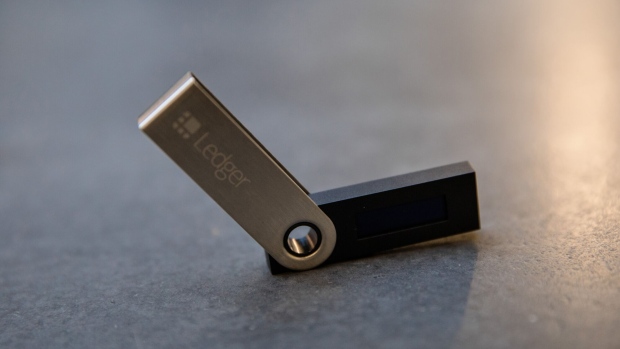Where is Bitcoin Blockchain Stored: Unveiling the Cryptocurrency’s Secret Storage Hub

The bitcoin blockchain is stored in a decentralized network of computers called nodes. Bitcoin’s blockchain, the decentralized ledger that records all transactions, is stored across a network of computers known as nodes.
These nodes hold a copy of the entire blockchain, ensuring that no single entity has control over the data. This decentralized nature provides security and transparency to the bitcoin network, making it resistant to censorship and fraud. Each time a new transaction is made, it is added to the blockchain and replicated across all nodes, ensuring consensus and immutability.
With this distributed storage system, the bitcoin blockchain remains secure and accessible to anyone with an internet connection. The decentralized storage of the bitcoin blockchain is one of its fundamental features that sets it apart from traditional centralized databases.

Credit: www.reuters.com
The Decentralized Nature Of Bitcoin Blockchain
How Does Decentralization Contribute To Security?
Decentralization is a fundamental aspect of the bitcoin blockchain that sets it apart from traditional centralized systems. By distributing the responsibility for maintaining the blockchain across a network of computers, decentralization provides several key benefits to the security of the bitcoin network:
- Resilience to attacks: Due to its decentralized nature, the bitcoin blockchain is resilient against various types of attacks. Each computer, known as a node, in the network participates in the verification and validation of transactions. This means that no single point of failure exists, making it extremely difficult for malicious actors to compromise the security of the network.
- Immutability of data: The decentralized nature of the bitcoin blockchain ensures that once a transaction is recorded, it becomes nearly impossible to alter or tamper with. As transactions are broadcasted to the network and verified by multiple nodes, a consensus is reached on the validity of the transaction, ensuring the integrity and immutability of the blockchain.
- No central authority: Unlike traditional financial systems that rely on a central authority, such as a bank, to oversee transactions, the bitcoin blockchain operates without a single governing entity. Decentralization removes the need for trust in a central authority and instead relies on the consensus of multiple participants in the network. This peer-to-peer network structure enhances security by eliminating the vulnerability associated with a central point of control.
- Enhanced privacy: Decentralization also contributes to the privacy of bitcoin transactions. Since the network is not controlled by a central authority, it can provide users with pseudonymity by allowing them to transact without revealing their real-world identities. This decentralization of information helps protect user privacy and prevents the tracking and profiling of individuals based on their financial activities.
Distributed ledger technology explained:
Distributed ledger technology (dlt) lies at the heart of the decentralization of the bitcoin blockchain. Here are some key points to understand about dlt:
- Shared replication: Distributed ledger technology involves multiple computers, or nodes, replicating and maintaining copies of the same information or database. This replication ensures that no single point of failure exists, greatly enhancing security and reliability.
- Consensus mechanisms: To maintain the integrity of the ledger, distributed systems utilize consensus mechanisms. These mechanisms ensure that all participants in the network agree on the validity of transactions and the state of the ledger. In the case of bitcoin, the consensus mechanism is proof-of-work, which requires nodes to solve complex mathematical puzzles to validate transactions and create new blocks.
- Transparency and accountability: One of the key advantages of distributed ledger technology is its transparency. As all transactions are recorded and replicated across multiple nodes, anyone with access to the network can inspect the entire transaction history. This transparency enhances accountability and trust among participants, as it becomes difficult to manipulate or distort information.
- Smart contracts: Another innovation enabled by distributed ledger technology is the concept of smart contracts. These self-executing contracts automatically execute predefined actions when certain conditions are met. Smart contracts eliminate the need for intermediaries and provide a secure and efficient way to automate complex transactions.
Decentralization plays a crucial role in ensuring the security and integrity of the bitcoin blockchain. Its distributed nature provides resilience, immutability, privacy, and removes the need for a central authority. Distributed ledger technology further underpins the decentralization, enabling shared replication, consensus mechanisms, transparency, and the utilization of smart contracts.
This combination of decentralization and distributed ledger technology makes the bitcoin blockchain a secure and transparent platform for conducting transactions.
The Role Of Nodes In Storing The Bitcoin Blockchain
What Are Nodes?
- Nodes are individual computers or devices that participate in the bitcoin network.
- They store a copy of the entire blockchain, which contains the history of all bitcoin transactions.
- Nodes can be run by anyone, making the network decentralized and resilient.
How Do They Contribute To The Blockchain’S Storage?
- Nodes play a vital role in storing the bitcoin blockchain by hosting a complete copy of the transaction history.
- They act as custodians of this distributed ledger, ensuring its availability and accessibility.
- When a new transaction occurs, nodes validate and propagate it to other nodes, further strengthening the blockchain’s storage.
The Process Of Verifying And Storing Transactions:
- Nodes receive new transactions and verify their validity by checking if the sender has sufficient funds and follows the rules of the protocol.
- Once validated, nodes add the transaction to a new block they are currently mining or contribute it to the network’s pool of unconfirmed transactions.
- The miner who successfully mines the next block includes the verified transactions in the block and adds it to the blockchain.
- Other nodes then update their copy of the blockchain to reflect the newly added block, ensuring consensus across the network.
Benefits Of Nodes In Storing The Blockchain:
- Distributed storage: With multiple nodes storing the blockchain, no single point of failure exists, making it highly resistant to tampering or data loss.
- Increased security: The decentralized nature of nodes makes the blockchain more secure against attacks since an attacker would need to control the majority of nodes to alter the data.
- Accessibility: Nodes allow anyone to access the blockchain, promoting transparency and openness.
- Network health: Nodes actively contribute to the network by verifying and propagating transactions, ensuring its smooth operation.
Nodes play a crucial role in storing the bitcoin blockchain, acting as participants who validate, verify, and propagate transactions. Their distributed storage ensures the blockchain’s security, accessibility, and resilience. By contributing to the network’s health, nodes foster transparency and decentralization within the world of cryptocurrencies.
Public Vs. Private Keys: Securing The Blockchain
Importance Of Public And Private Keys
Public and private keys are crucial elements in securing the bitcoin blockchain. They play distinct roles in ensuring the confidentiality and integrity of transactions. Here’s a closer look at why public and private keys are essential:
- Public keys serve as the address where other users can send bitcoin to the intended recipient. These keys are visible to everyone and act as a pseudonymous identifier. They offer a more secure alternative to sharing personal information, such as bank account numbers or credit card details.
- Private keys, on the other hand, are kept secret and uniquely correspond to a specific public key. They serve as a digital signature that allows users to prove ownership of their funds and authorize transactions. If a private key falls into the wrong hands, it can lead to unauthorized access and potential loss of funds.
- The use of public and private keys creates a system in which users can securely transact without revealing sensitive financial information. It enhances privacy and protects individuals from the risk of identity theft or fraudulent activities.
- Public and private keys also ensure the integrity of the blockchain by adding an extra layer of security. Transactions are cryptographically signed using private keys, making it nearly impossible for hackers to alter or tamper with the information stored in the blockchain.
- The sheer complexity and randomness of the keys make it extremely difficult for malicious actors to guess or generate the corresponding private keys. The use of cryptographic algorithms ensures a high level of security, making the bitcoin blockchain resilient to unauthorized modifications.
- It’s important for users to safeguard their private keys by using secure wallets or hardware devices that store the keys offline. By following best practices for key management and storage, individuals can minimize the risk of theft or unauthorized access.
Public and private keys form the foundation of security in the bitcoin blockchain. They enable users to transact securely, maintain privacy, and ensure the integrity of the blockchain’s information. By understanding their importance and taking appropriate measures to protect them, users can confidently participate in the world of cryptocurrencies.
Exploring The Role Of Miners In Blockchain Storage
Bitcoin blockchain is a decentralized ledger that stores all transactions ever made in a digital form. But where exactly is this valuable data stored? In this section, we will explore the role of miners in the storage and security of the blockchain.
What Are Miners?
Miners are individuals or organizations that contribute their computing power to maintain the bitcoin blockchain. They play a crucial role in the functionality and integrity of the network. Here are the key points to understand about miners:
- Miners validate and verify transactions by solving complex mathematical problems using powerful computers.
- The primary goal of miners is to add new blocks to the blockchain, ensuring the smooth operation of the network.
- They compete with each other to solve these puzzles, and the first miner to find the answer gets to add the next block to the chain.
How Do They Contribute To The Storage And Security Of The Blockchain?
Miners contribute to both the storage and security aspects of the blockchain in the following ways:
- Verification of transactions: Miners validate and verify transactions by confirming the accuracy and authenticity of each one. This helps maintain the integrity of the blockchain and prevents double-spending.
- Creating new blocks: Miners create new blocks by confirming a group of transactions and linking them to the previous block in the chain. This process forms the basis of the decentralized storage system for the bitcoin blockchain.
- Securing the network: Miners ensure the security of the blockchain by making it computationally expensive to rewrite transaction history. Once a block is added to the chain, it becomes very difficult to alter, providing a robust and tamper-proof storage system.
Mining Process And Rewards
The mining process involves the following key steps:
- Gathering pending transactions: Miners collect a set of unconfirmed transactions, also known as the mempool, from the network.
- Hashing the block header: Miners combine the data of the transactions with other relevant information and create a unique hash called the block header.
- Solving the puzzle: Miners repeatedly change a piece of data called the nonce in the block header until they find a hash that meets certain criteria.
- Adding to the blockchain: Once a miner finds a valid hash, they broadcast the new block to the network, which then adds it to the blockchain.
Mining is resource-intensive and requires a significant amount of computational power. As a reward for their efforts, miners are awarded newly minted bitcoins and transaction fees from the included transactions.
Miners are an essential component of the bitcoin blockchain system. Their role in validating transactions, creating new blocks, and securing the network ensures the storage and security of this groundbreaking technology.
Understanding Blockchain Wallets: Where Your Bitcoin Is Really Stored
When it comes to bitcoin, many people wonder where exactly their digital currency is stored. The answer lies in blockchain wallets, which serve as the virtual containers for your bitcoins. These wallets are not physical objects that you can hold in your hand, but rather, they exist in the digital realm.
In this section, we will explore the different types of wallets and how they store your private keys while interacting with the blockchain.
Different Types Of Wallets
There are several types of wallets available for storing your bitcoin, each with its own unique characteristics and advantages. Familiarizing yourself with these wallet types will help you choose the one that best suits your needs:
- Hardware wallets: These physical devices, resembling usb drives, provide excellent security as they store your private keys offline, away from potential online threats.
- Software wallets: These wallets are applications that you can install on your computer or mobile device. They offer convenience and ease of use, but their security level may vary depending on their implementation and the security measures you have in place.
- Paper wallets: A paper wallet involves printing out your bitcoin’s private and public keys onto physical paper. This method offers offline storage and can be a secure option if you take necessary precautions.
How Wallets Store Private Keys And Interact With The Blockchain
In order to understand where your bitcoin is stored, it is crucial to grasp how wallets store private keys and their interaction with the blockchain:
- Private keys: Wallets store private keys, which are essentially secret codes that allow you to access your bitcoin. These keys are mathematically linked to your bitcoin address and are used to sign transactions on the blockchain.
- Public keys: Wallets also generate public keys, which are derived from the private keys. Public keys are shared openly and serve as your wallet’s address, allowing others to send bitcoin to you.
- Blockchain interaction: When you initiate a bitcoin transaction, your wallet uses your private key to digitally sign the transaction. This signature is then verified by the blockchain network, ensuring the validity of the transaction.
Security Measures For Protecting Your Bitcoin
Protecting your bitcoin requires implementing robust security measures. Consider the following precautions to safeguard your digital assets:
- Strong passwords: Ensure your wallet is protected by a strong, unique password. Avoid using common words or personal information.
- Two-factor authentication (2fa): Enable 2fa for your wallet, adding an additional layer of security by requiring a second verification step for accessing your funds.
- Regular updates: Stay up to date with software updates for your wallet, as these often include security patches and enhancements to protect against emerging threats.
- Offline storage and backups: Consider storing a backup of your wallet’s keys offline, in a secure location such as a safety deposit box. This reduces the risk of loss or theft due to online vulnerabilities.
Understanding where your bitcoin is stored involves comprehending the concept of blockchain wallets and the role they play in securely storing your private keys. By choosing the right type of wallet and implementing appropriate security measures, you can ensure the safety of your precious bitcoin holdings.
The Future Of Blockchain Storage: Scalability And Advancements
As blockchain technology continues to gain momentum, the need for efficient and scalable storage solutions becomes increasingly important. In this section, we will explore the challenges of blockchain storage, potential solutions for scalability, and the impact of emerging technologies on storage.
Challenges Of Blockchain Storage
Blockchain storage presents numerous challenges that need to be addressed in order to ensure the long-term viability and scalability of the technology. Some of these challenges include:
- Scalability: As more transactions are added to the blockchain, the size of the ledger grows exponentially. This creates scalability issues, making it difficult for the network to handle a large number of transactions simultaneously.
- Storage costs: Storing the entire blockchain on every node in the network is resource-intensive and costly. As the size of the blockchain increases, so do the storage requirements, which can be a significant barrier to entry for smaller nodes.
- Data privacy: Blockchain networks are designed to be transparent and decentralized, but certain data stored on the blockchain may need to be kept private. Balancing the need for privacy with the principles of decentralization is a challenge in blockchain storage.
Potential Solutions For Scalability
To address the scalability challenges of blockchain storage, several potential solutions are being explored. These include:
- Sharding: Sharding involves dividing the blockchain into smaller, more manageable parts called shards. Each shard is responsible for processing a subset of transactions, allowing for increased transaction throughput and scalability.
- Off-chain solutions: Off-chain solutions involve moving certain transactions and data off the main blockchain, reducing the burden on the network. Layer-2 protocols such as the lightning network for bitcoin and state channels for ethereum are examples of off-chain scalability solutions.
- Consensus algorithm improvements: Consensus algorithms, such as proof of stake (pos), aim to improve scalability by reducing the computational requirements of the network. Pos algorithms select validators based on the number of coins they hold, rather than the amount of computing power they contribute.
Emerging Technologies And Their Impact On Storage
As technology continues to advance, new solutions to the challenges of blockchain storage are emerging. Some of these technologies and their potential impact include:
- Distributed storage networks: Distributed storage networks use decentralized protocols to store data across a network of nodes. This approach reduces costs, increases redundancy, and improves the scalability of blockchain storage.
- Interoperability protocols: Interoperability protocols enable different blockchain networks to communicate and share data seamlessly. These protocols allow for the exchange of assets and information between different blockchains, enhancing the overall storage capacity of the blockchain ecosystem.
- Blockchain-as-a-service (baas) platforms: Baas platforms provide developers with pre-built infrastructure and tools to deploy and manage blockchain applications. These platforms offer scalable and cost-effective solutions for blockchain storage, making it easier for businesses to adopt and utilize blockchain technology.
The future of blockchain storage lies in scalability and advancements. By addressing the challenges of scalability, exploring potential solutions, and leveraging emerging technologies, blockchain storage can realize its full potential and become a vital component of the digital economy.
Frequently Asked Questions For Where Is Bitcoin Blockchain Stored
Where Is The Bitcoin Blockchain Stored?
The bitcoin blockchain is stored on thousands of computers around the world, forming a decentralized network.
How Is The Bitcoin Blockchain Stored?
The bitcoin blockchain is stored using a technology known as distributed ledger, which ensures its security and immutability.
Who Controls The Bitcoin Blockchain?
No single entity controls the bitcoin blockchain. It is maintained and controlled by the collective efforts of the bitcoin network participants.
Why Is The Bitcoin Blockchain Decentralized?
The decentralized nature of the bitcoin blockchain ensures that no single party has control over the network, making it resistant to censorship and tampering.
Can The Bitcoin Blockchain Be Hacked?
The bitcoin blockchain has never been hacked since its inception in 2009. Its strong cryptographic security makes it highly resistant to hacking attempts.
Conclusion
With the rise in popularity of bitcoin, many people are curious about the storage of its blockchain. It is essential to understand that the bitcoin blockchain is not stored in a single, centralized location. Instead, it is stored across a vast network of computers, known as nodes, all around the world.
These nodes work together to maintain a decentralized ledger, ensuring the security and integrity of the bitcoin blockchain. Each node contains a copy of the entire blockchain, meaning that even if some nodes go offline, the blockchain remains accessible and secure.
This distributed storage system is one of the key features that make bitcoin so resilient and resistant to manipulation. So, the next time you wonder where the bitcoin blockchain is stored, remember that it is spread out across thousands of nodes globally, ensuring its reliability and security.







